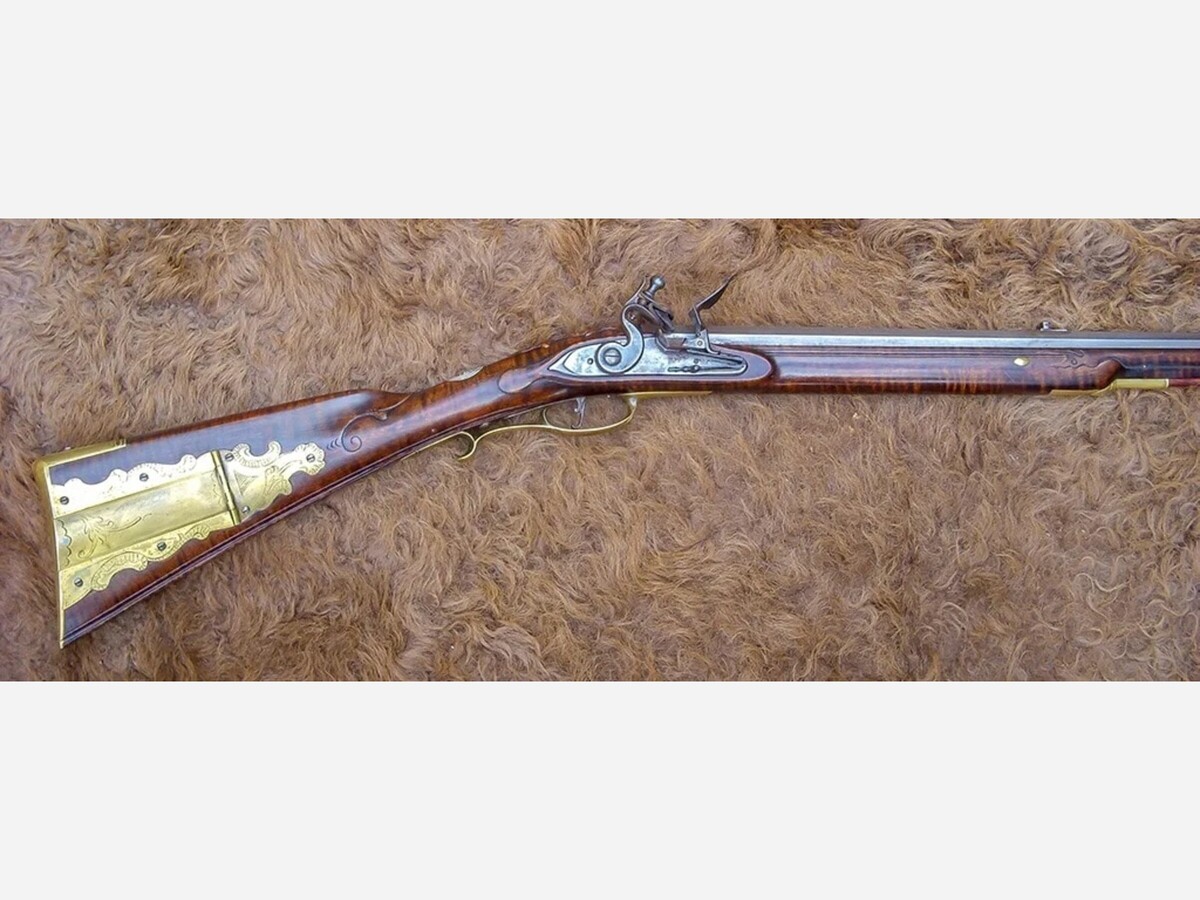Image

Photograph from William Antes webpage
by Bob Wood*
Lancaster was the center of rifle making during the 18th century, but there was also a very thin scattering of gunsmiths throughout Southeastern Pennsylvania.
In colonial New Hanover, it seems guns and rifles were fairly rare. The notion that every farmer had a gun or rifle to protect himself from Indians and his livestock from predators doesn’t seem to hold out. Early estate inventories seldom mention guns; and when they do, the gun doesn’t seem to amount to much. One of the few inventories that mention guns is the 1741 estate of wealthy Upper Frederick farmer George Philip Dodderer which includes, “To 2 guns one sword one tanckard [sic], one cup and botle—2 [pounds]--1 [shilling].” The interesting thing is that the guns were listed in a lot with a cup, bottle, and tankard.
As for protection from predators, the earliest settlers let livestock such as pigs and sheep free to roam and forage unfenced. This would have been impossible if there were predators such as wolves, bears, and mountain lions remaining in the region. Perhaps those were all hunted-out by the Indians for fur-trade in the 17th century.
Another indication of a scarcity of early local firearms is that a century later during the early 1800’s many men still drilled with cornstalks and bake oven wood at the militia musters. The country was a good deal more prosperous by then, yet the county-wide annual battalion day was a sort of joke. Most men had no weapons. The Dutchmen called it the “bakholtzparade.” “Bakholtz” were six-foot-long pieces of bake-oven fire wood carried like guns. However scarce early rifles may have been, that William Antes was a gunsmith there is no doubt.
In his 1903 history of the Dotterer Family, Henry S. Dotterer noted about William Antes, “It is stated, by family tradition, that he was an expert mechanic, and that in his own blacksmith shop, in New Hanover Township, large quantities of damaged arms were repaired for the government.” Interestingly, William Antes’ blacksmith shop was on property he later sold to Abraham Markley whose son John continued the craft. In the 20th century this property became the Elliott farm and is now Bella Vista.
Because of his very active involvement with the administration of the war (a war in which it increasingly looked as though the Patriots would lose), Antes sold his property in New Hanover and moved to Mahoning Township, Northumberland County. He was in mortal danger should he ever be captured by the British. Tax records in Mahoning list him as a gunsmith, and it may well be that his signed rifles mentioned in last week’s column were made there.
In any case, the Pennsylvania Archives, Volume VI, page 453 records these interesting letters from the spring of 1778:
“The supreme executive Council sent a letter dated Lancaster, [the government fled to Lancaster when the British took Philadelphia], April 28th, 1778, to Col. Wm. Antis, requesting the earliest information of the number of arms in and belonging to the state, as well such as are in the hands of private people as those in possession of the Lieutenants of Counties, and in the public works. They requested immediate information of the number of muskets well fitted now in his possession, and how man more he can completely finish by the 20th of May.”
Antes’ reply was directed to “His Excellency Thomas Wharton, Jun’r. President of the Executive Council.
“Newhanover Township, May the 1st 1778.
Sir:
I have received your letter of the 28th of April last past, wherein I am requested to give immediate information to council what number of muskets well fitted are now in my possession, and how many more I could completely finish by the 20th of May Instant. These are therefore to inform council that I have twenty-five in my possession, and as touching what number I could finish against the twentieth of May, I do hereby inform council that I have none that will be finished against that time, as I am not at present in a proper situation to follow that Business, neither have I heretofore followed that branch of business for the publick, excepting in the way of Cleaning and repairing of Arms, and that about 500 stand of arms was sent to me last fall for that purpose by General Potter, which when cleaned and repaired 361 of them were sent to the rear of the Army by order of his Excellency Gen. Washington, and the remainder was sent to Militia Camp by order of Major Cummings, and that 161 muskets was sent last fall to Col. Frederick Antes [William’s brother] for the purpose aforesaid, which hath since been taken by order of Col. Wm. Henry to factory at Allentown, in order to be repaired there. The above is all the Information I can give at present respecting of public arms that have come within my district.
I am Sir, with respect, Your Humble Servant, William Antes”
So, Antes wrote from New Hanover in 1778 that “neither have I heretofore followed that branch of business for the public,” suggesting that his signed rifles were made after he had moved up-state. Nevertheless, these records indicate that he was a gunsmith while here in New Hanover.
*Bob Wood--writer, artist, potter, historian, and volunteer--is a popular speaker; local history is his niche. Bob has published four books on local history.